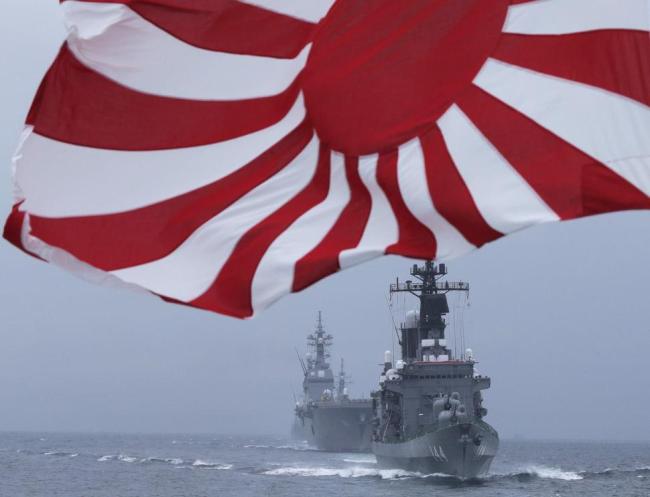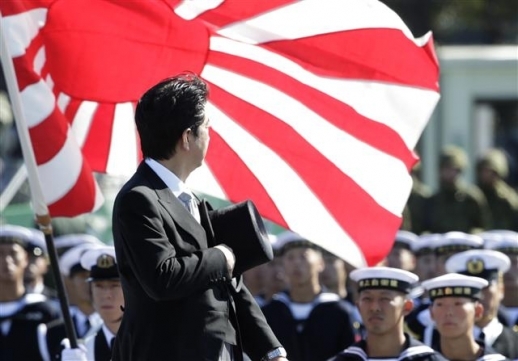Controversy over the Japanese Rising Sun Flag shows no sign of abating ahead of an international naval festival to be held in Korea next week, with politicians and activists calling for measures to ban what they see as a symbol of Japanese military imperialism.
A ruling party lawmaker proposed a bill to ban the entry of Japanese warships to the South Korean territory if they raise the Rising Sun Flag. And a well-known professor sent emails abroad to denounce the Japanese decision to show the controversial flag at the international event.
Some liberal politicians have even suggested that when President Moon Jae-in welcomes foreign vessels at the upcoming naval fleet review, he should sit on a ship named after Dokdo, the rocky islets in the East Sea controlled by Seoul but claimed by Tokyo.
“Our request is to change the presidential ship to Dokdo” from the current presidential ship named after Seongsan Ilchulbong, a famous tourist destination off the coast of Jeju Island where the naval festival takes place from Oct 10-14, said Rep. Min Hong-chul of the Democratic Party of Korea.
“Despite our Navy’s respectful request, the Japanese are sticking with their decision to raise the flag representing their war crimes. ... The Japanese are simply being rude,” the lawmaker said in an interview with local broadcaster TBS.
 |
(Yonhap) |
The controversy erupted when the South Korean Navy requested last week that all vessels participating in the Jeju fleet festival refrain from using their own military flags -- such as the Japanese Rising Sun Flag -- to express their nationality.
Instead, the Navy asked the participating ships to raise their own national flag and South Korea’s national flag Taegeukgi. The Navy’s spokesperson claimed on Sept. 27 that raising the national flags was a “principle” established by international customs.
The Japanese Defense Ministry, however, pushed back, asserting it has every right under domestic and international law to raise whichever flag it sees fit as a way to distinguish warships from commercial vessels.
“Under the Japanese law, it is mandatory for warships to raise their own military flag,” Japan’s Defense Minister Itsunori Onoder told reporters on Sept. 28. “Under the international maritime treaty, (the Rising Sun Flag) is recognized as an exterior mark to express the warship’s nationality.”
Since being adopted as the naval ensign of the Imperial Japanese Navy in the late 19th century, the Rising Sun Flag has been used as an official flag for the Japan Maritime Self-Defense Force. A modified version is also flown by the Japan Ground Self-Defense Force.
In South Korea, the military flag has long been considered a symbol of the repressive Japanese colonial rule and usage in international events has prompted public backlash. The same is true in other Asian countries that were at one time under Japanese colonial rule, including China.
The Navy said it would continue to demand Japan refrain from raising the controversial flag during the fleet review, though there are no measures to enforce such restrictions under international law.
“We have never changed our position that when the vessels undergo the review process, they need to raise their own national flags and Taegeukgi on their masts,” Navy spokesperson Col. Kim Tae-ho said in a regular press briefing on Thursday.
Asked about whether the Navy is considering using the Dokdo ship as the principle vessel carrying President Moon, the spokesperson declined to comment. Some officials have suggested there may not be enough time to change ships, as the event is only about a week away.
 |
Japanese Prime Minister Shinzo Abe pays tribute to Rising Sun Flag. Yonhap |
Equivalent to Swastika?
Criticism over the Japanese use of Rising Sun Flag continues to mount in South Korea, where Japan’s 36 years of occupation are etched in the memory of many and somewhat rekindled by the Moon administration’s increased pressure over Tokyo’s past wrongdoings.
Rep. Lee Suk-hyun of Democratic Party, which echoes President Moon’s hard-line stance against Japan, introduced Tuesday a bill designed to punish those who wear clothes showing the Rising Sun Flag.
The victims of Japan’s wartime sexual slavery also joined the fray. In protesting against the Japanese reluctance to provide “sincere apology” on Tuesday, the victims group urged the Japanese Prime Shinzo Abe to pull out the warship raising the controversial flag.
“I want to convey this message to Abe: How dare you to carry the flag? You should be cautious. We are not going to sit down and do nothing,” said Kim Bok-dong, 92, one of the victims of the Japanese sex slavery.
During the parliamentary session Monday, Prime Minister Lee Nak-yeon said the Japanese should have thought “carefully” about the impact of their decision to put the controversial flag on the warship entering the South Korean territory.
Some experts noted there are differences between the Korean and Japanese in perceptions of the Rising Sun Flag and that is why the two countries constantly engage in diplomatic scuffles over the issue of raising a flag.
While Many Koreans regard it as a symbol of war crimes committed by the imperialist Japan and compare it to the Nazi Swastika, the analysts said, the Japanese has recently considered it as acceptable image incorporated into pop culture.
“At first, the Japanese were reluctant to use the flag at an international events. But the young people begin to use it at sporting events without knowing what it really represents,” said Hosaka Yuji, a Japanese-turned-Korean scholar, who studies Japan and regional politics at Sejong University.
While the public display of Swastika and other Nazi symbol is strictly prohibited by Germany and other European countries, there is no such regulations in Japan and Korea to ban the use of the Rising Sun Flag.
In fact, Japanese warships raising the controversial flag entered the South Korean territory in 1998 and 2008. The warships came to Busan to participate naval fleet review similar to the one in 2018.
Some experts said since there are no such prohibiting regulations in the US and other western countries as well, the Korean government should come up with better regulations to enforce the restriction and further consultation with neighboring countries.
“I’m afraid it would be a completely domestic debate,” said Kim Dae-young, a military analyst at the Korea Research Institute for National Strategy in Seoul. “Getting upset and being emotional is not the best solution in diplomacy.”
By Yeo Jun-suk (
jasonyeo@heraldcorp.com)





![[Herald Interview] 'Trump will use tariffs as first line of defense for American manufacturing'](http://res.heraldm.com/phpwas/restmb_idxmake.php?idx=644&simg=/content/image/2024/11/26/20241126050017_0.jpg)


![[Health and care] Getting cancer young: Why cancer isn’t just an older person’s battle](http://res.heraldm.com/phpwas/restmb_idxmake.php?idx=644&simg=/content/image/2024/11/26/20241126050043_0.jpg)
